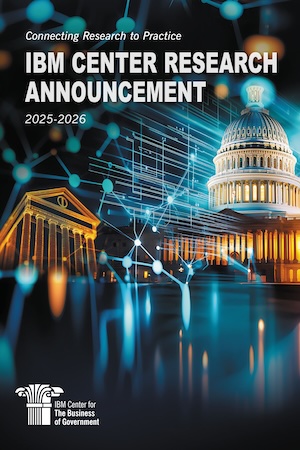
Forthcoming Research Reports

Through these and all Center reports, we seek to advance practical research that benefits public sector leaders and managers.
We expect the following reports to be published starting in late 2026. Short summaries of each report follow:
Enhancing Career Path Permeability and Flexibility in the U.S. Federal Workforce by Loren Schulman, Federation of American Scientists
This research will focus on the need for enhanced career path permeability and flexibility within the federal workforce, specifically addressing how to design high-integrity pathways that encourage people to move in and out of government, do not penalize exits and reentries, and promote talent exchange across sectors. In a rapidly evolving labor market, traditional, linear career trajectories are far less relevant, necessitating more dynamic and adaptable professional journeys. This report will explore how the government can position itself as a core career chapter, not an all-or-nothing destination.
Public-Private Intelligence Partnerships in a World of Ubiquitous Information by Dr. Gregory Treverton, University of Southern California
American intelligence services traditionally thought of private sector news outlets as competition. Now, though, the profusion of private sector “intelligence” organizations — from crowd-sourced open source investigators to business intelligence houses — opens new possibilities for collaboration across the public-private divide. Taking advantage of this will require intelligence professionals to adjust methods in enabling cross-sector partnerships. This report will draw on lessons learned from past efforts and present conditions to address new models and innovations for collaboration.
Reducing Burden and Increasing Access in Benefits Program Delivery by Leveraging AI and Automation by Cleopatra Charles, Rutgers University
Millions of older adults in the United States struggle to access essential food assistance programs due to administrative barriers such as complex applications, unclear eligibility rules, and cumbersome recertification processes. Nearly 60% of eligible seniors do not receive benefits—not because they are ineligible, but because systems are difficult to navigate, especially for those without digital access or strong support networks. This research explores how artificial intelligence, automation, and cross-agency data integration can reduce these burdens and improve benefit uptake among older adults. Through case studies, interviews, and policy analysis, the study will identify effective technological solutions, assess financial and operational impacts, and propose frameworks for public-private partnerships. It will also offer equity-focused, user-centered design recommendations to ensure modernization efforts enhance accessibility and trust. Grounded in both scholarly research and lived experience, the project seeks to provide actionable guidance for government agencies to make benefits delivery more efficient, equitable, and humane.
Predictive Cybersecurity and Privacy-Preserving Automation for Public Sector Resilience by Arnold Webster, Purdue Global University
This cybersecurity research initiative will equip government leaders with strategies to enhance data protection, predict emerging threats, and automate secure responses—while maintaining privacy and identity assurance. Drawing from AI, risk analytics, and access control frameworks, the report will offer actionable insights for public managers. This research will do so by evaluating current cyber risks, mapping effective technology interventions, and providing a blueprint for integrating automation and human oversight in identity and threat management, The report will offer a high-value, timely roadmap for cybersecurity modernization across public sector organizations.
Technology and Administrative Burden Reduction in Government Services: A Comparative Research Study by Reilly Martin, Technologists for the Public Good
This report will focus on user-centered technology that streamlines service delivery and reduces administrative burdens in critical areas like disaster relief and healthcare. Researchers will conduct applied research on government user experience improvement. The report will provide successful models, new approaches, and scalable frameworks for human-centered service delivery through field studies, comparative analysis, and interviews with government partners and current and former government employees. Expected outcomes include a framework for reducing administrative burdens, evidence-based scaling recommendations, and actionable insights for agencies implementing user-focused service delivery innovations.
Training Local Government for Ethical AI Adoption by Dr. Sharon Strover, University of Texas at Austin
This report will examine AI governance and training considerations within city governments to ensure responsible AI adoption and enhance public trust. The research will investigate the range of systems characteristic of local efforts to link AI capabilities to sensing and monitoring tasks. The report will comprehensively present governance best practices, provide content for training and community factors that cities must consider as they adopt AI tools, and explore best practices for data and analytics. A framework for creating effective AI capabilities will highlights AI use and plot directions for future action.
Unconventional Resilience: Applying Special Operations Thinking to Urban Emergencies by Anna Gielas, PhD, Centre for Global Knowledge Studies
In light of the rising incidence of natural and human-made disasters, this report will outline approaches to strengthen disaster response across U.S. cities. The research will focus on the elements that enable U.S. Special Operations Forces (SOF) to operate successfully under conditions defined as volatile, uncertain, complex, and ambiguous. The report will identify SOF's decentralized leadership, expeditionary logistics, and human domain expertise as key enablers, and translate those elements and make recommendations for first reponders. A flexible implementation framework and concise checklists will help make these insights scalable across different municipalities. Ultimately, the report will a new set of strategies to enhance civilian government resilience.



